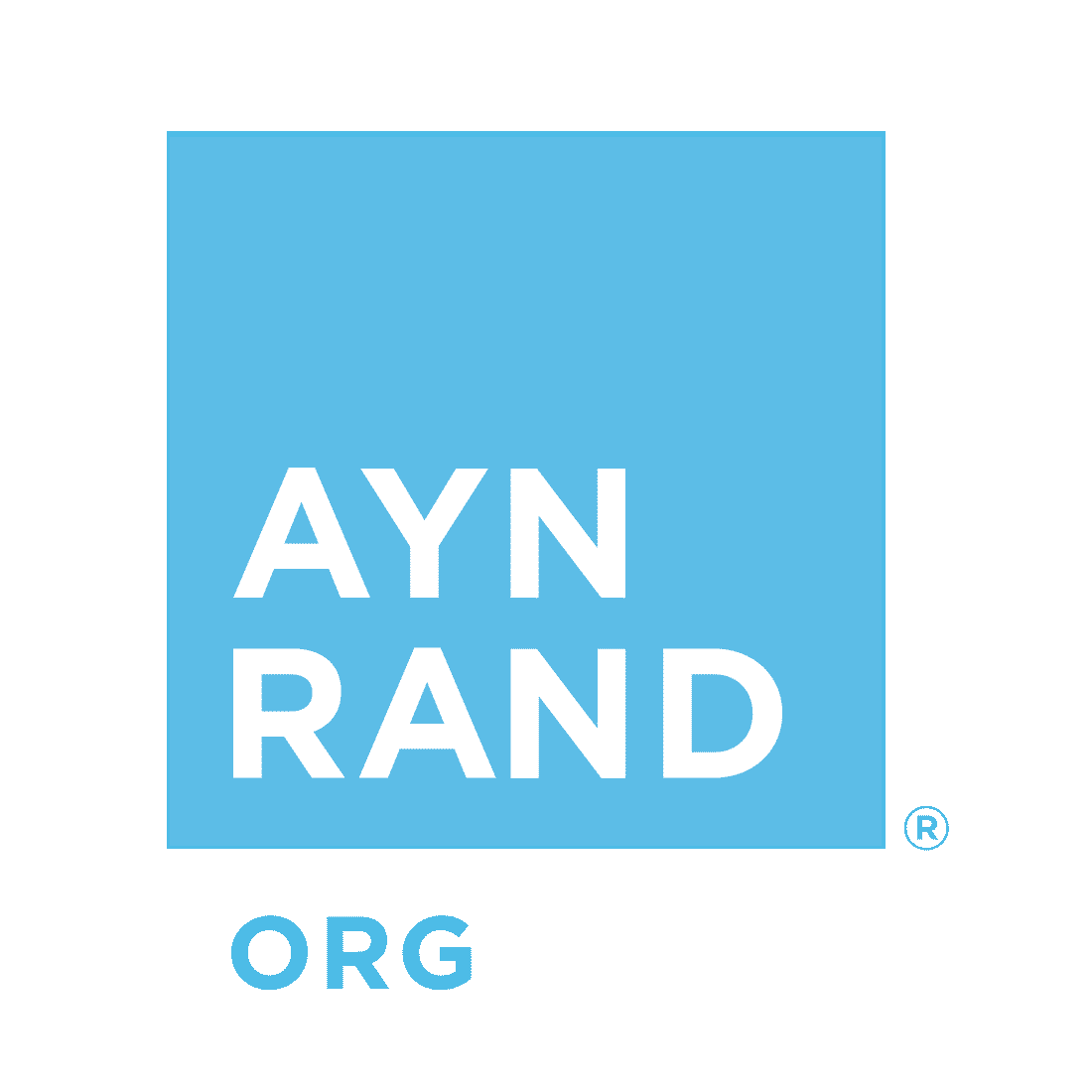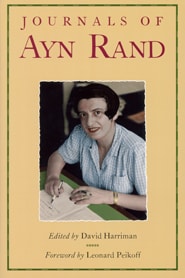

How did Ayn Rand develop her ideas? How did she plan her novels? The answers to those questions, and many more, can be found in Journals of Ayn Rand.
Edited by Objectivist scholar David Harriman, Journals contains Rand’s notes to herself, made over the course of her life.
We see Rand as an untried screenwriter in Hollywood and share her painful memories of Communist Russia and her struggles to bring them to dramatic life in We the Living. We witness the step-by-step emergence of the characters and plot of The Fountainhead and Atlas Shrugged, along with the years of painstaking research that would imbue her novels with powerful authenticity. And we are with her as she explores the basic questions of philosophy and builds the foundation of what will become her philosophy, Objectivism.
— Leonard Peikoff, “Forward,” Journals of Ayn Rand
Journals of Ayn Rand contains most of the notes for Ayn Rand’s three main novels, along with some notes made between The Fountainhead and Atlas Shrugged, and some notes from her final decades.
The early material includes, among other things, Rand’s first philosophic musings on paper in English, written in her twenties. The middle sections contain a transitional statement on ethics, never finished, and also a vigorous essay on why the House Un-American Activities Committee in 1947 did not violate the civil rights of the Hollywood Communists. The final section includes the notes for Rand’s last projected novel, To Lorne Dieterling.
Readers will discover the real-life inspirations for some of Rand’s characters, the extent to which she was (and was not) influenced by Nietzsche, and the origins of some of her most important philosophic ideas.
“I believe — and I want to gather all the facts to illustrate this — that the worst curse on mankind is the ability to consider ideals as something quite abstract and detached from one’s everyday life. The ability to live and think quite differently, thus eliminating thinking from your actual life. This applied not to deliberate and conscious hypocrites, but to those more dangerous and hopeless ones who, alone with themselves and to themselves, tolerate a complete break between their convictions and their lives, and still believe that they have convictions. To them, either their ideals or their lives are worthless — and usually both. (April 9, 1934)”
Although Rand admired the philosopher Friedrich Nietzsche for projecting at times “a magnificent feeling for man’s greatness,” she regarded him as an opponent, classifying him philosophically as “a mystic and an irrationalist.”
In Journals we see Rand develop this perspective. As her longtime student and associate Leonard Peikoff points out in the introduction, in Rand’s earliest notes there is a noticeable Nietzschean influence “in the form of droplets of subjectivism, and of the idea that the heroes among men are innately great, as against the inherently corrupt masses, who deserve only bitterness and domination from their superiors.”
But as Peikoff also notes, through the course of Journals we see “these droplets — every one of them — evaporate without residue, as [Ayn Rand]’s own principles emerge into the sunshine of explicit statement.” By the time Rand reaches The Fountainhead, she has fully separated her views from Nietzsche’s.
From the time Rand starts thinking about philosophy, one of her primary concerns is how to place morality on a rational basis.
Following the publication of The Fountainhead, Rand begins work on a nonfiction ethical treatise, “The Moral Basis of Individualism.” In the first draft of the treatise, she bases her morality on an axiom: “Man exists and must survive as man.”
But as Rand reviews this draft, she reaches an important insight: “Chapter I should begin by stating the axiom. Then define man’s nature. Then ask” — she then crosses out the last two words — “Or — begin by asking whether a moral code is necessary? Prove that it is — for a rational being.”
This line of questioning would ultimately lead Rand to her full proof of her moral theory — one that argues that a moral code is necessary only because man is a living being who needs principles in order to survive.
In Journals we see Rand develop a unique conception of the psychology of evil as she plans her novels. From her earliest notes, Rand conceives of evil as the desire to crush others because one feels inferior to them — a motive that she would ultimately identify as “hatred of the good for being the good.”
In Rand’s view, in order to rationalize this motive to themselves and others, this mentality counts on evil philosophical ideas — ideas that include egalitarianism, Communism and altruism.
What could lead someone to this state? By the time of The Fountainhead, Rand sees evil as the product of a fear of independent thinking. In her notes for Atlas Shrugged, she identifies the source of this fear: a lifelong pattern of choosing not to think, but to evade reality.
In Journals we have the privilege of watching a powerful intellect think on paper. Among the important lessons is the need to challenge one’s own ideas with probing questions. Rand does this often.
For example, Rand originally planned Atlas Shrugged to be a shorter novel than The Fountainhead, political and social in its theme and containing no new philosophical ideas. But as she worked on the novel, as she later reported in an interview, she asked herself such questions as “Why is the mind important? What specifically does the mind do in relationship to human existence? It’s then I began to see that this is going to be a very important and new philosophical novel. There was a great deal more to say than merely what I had said in The Fountainhead.”
In her notes on Atlas Shrugged, we witness Rand asking these questions and expanding her ideas and the scope of the novel.
Rand grew up in Communist Russia, and throughout Journals we see her unique perspective on Communism. She views its rise and bloodshed not as some inexplicable accident but as the logical consequence of certain ideas.
Like every other form of dictatorship, Communism is at root the theory “That the State is superior to the individual. That the Collective holds all rights and the individual has none.” This is the source of Communism’s evil — it sacrifices individuals — but also of its popularity: since most people believe self-sacrifice is moral, Communism offered “a definite goal, inspiration and ideal, a positive faith.”
Thus, in Journals, we see Rand’s assessment that efforts to fight Communism through purely political means, such as the House Un-American Activities Committee, at which she testified, were ultimately futile. The only way to fight collectivism is to replace altruism with a morality of rational self-interest.